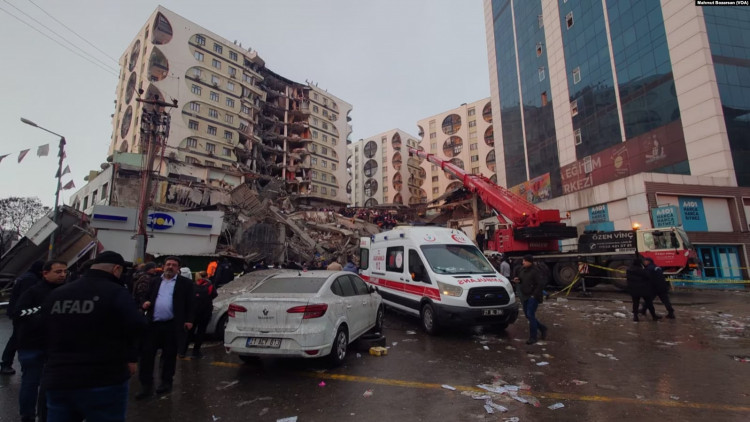A second earthquake hit the border region of Turkey and Syria on Monday, just two weeks after the region was ravaged by a bigger quake that killed more than 47,000 people and damaged or destroyed hundreds of thousands of dwellings.
The magnitude-6.3 quake on Monday was centered near the southern Turkish city of Antakya and was felt in Syria, Egypt, and Lebanon.
Monday, Turkey's Disaster and Emergency Management Agency (AFAD) reported that a tremor shook the southern province of Hatay, close to the border with Syria.
Monday, Turkish Interior Minister Süleyman Soylu stated that the earthquake's epicenter was in the Defne region of the province and that 26 aftershocks had occurred since.
As a result of Monday's aftershocks, Turkish officials report at least three deaths and 294 injuries.
Hours earlier, U.S. Secretary of State Antony Blinken stated during a visit to Turkey that Washington would help "for as long as it takes" as rescue operations in the aftermath of the Feb. 6 earthquake and its aftershocks drew to a close and the focus shifted to urgent shelter and reconstruction efforts.
AFAD said on Monday that the death toll from the earthquakes that struck Turkey two weeks ago has risen to 41,156 and is anticipated to rise further, with 385,000 apartments believed to have been destroyed or severely damaged and many more still unaccounted for.
President Tayyip Erdogan said that construction work on over 200,000 apartments in 11 earthquake-ravaged areas of Turkey will commence next month.
According to the U.S. Department of State, the total amount of U.S. humanitarian aid to Turkey and Syria in reaction to the earthquakes has reached 185 million dollars.
According to the UN agency for sexual and reproductive health, among the earthquake survivors are around 356 000 pregnant women who require immediate access to health services.
There are 226,000 women in Turkey and 130,000 women in Syria, of whom approximately 38,800 will give birth during the following month. Several of them had taken refuge in camps or been exposed to subfreezing temperatures, and they struggled to obtain food and potable water.
The United States Geological Survey (USGS) initially described the earthquake as having a magnitude of 6.4, at a depth of 10 kilometers, before adjusting it to 6.3.
The public has been urged by officials to avoid buildings. Monday morning, Turkish Vice President Fuat Oktay urged the public to refrain from entering damaged buildings, especially to retrieve personal things.
The Turkish Minister of Health, Fahrettin Koca, tweeted that 18 of the injured are in critical condition and have been taken to Adana and Dorteol. According to him, field hospitals continue to serve other patients.






